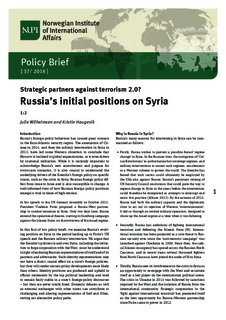| dc.description.abstract | This project examines the prospects for Russia-Western practical cooperation against the Islamic State (IS) in Syria and, more broadly, for a rapprochement between Russia, NATO and key NATO member states post-Crimea. The analytical point of departure is two-fold: Firstly, the project will examine how Russia’s longstanding rejection of a ‘Western’ world-order, along with various Western leaders’ increasing depiction of Russia as an ‘adversary’, shape the two parties’ room for manoeuvre with respect to practical collaboration on the ground in Syria. Secondly, and operationalizing ‘the West’ as two key ‘Atlanticist’ member states in NATO, the United States and Britain, it will examine how Russian and Western domestic debates constrain governments and political leaders’ scope for action, and their ability to adjust their commenced policy paths in Syria. When adversarial statements about ‘the other’ are voiced by state leaders in an international setting, they are often portrayed in the media as being reflective of that particular leader or government’s position alone. In this project, we suggest that the dynamics of Russia-Western relations cannot be properly understood without alsoconsidering how states’ security policies are empowered and limited by domestic security policy debates. The project will provide an up-to-date, in-depth analysis of how contemporary Russian, American and British security policies are being constituted and constrained by domestic debates. Furthermore, it will trace how domestically negotiated security policies materialize in actions on the ground in Syria. Against the backdrop of the empirical analysis, publications from this project will discuss the likelihood of these states finding common ground against IS in Syria, and the prospects for Russia-Western rapprochement more generally. | nb_NO |

